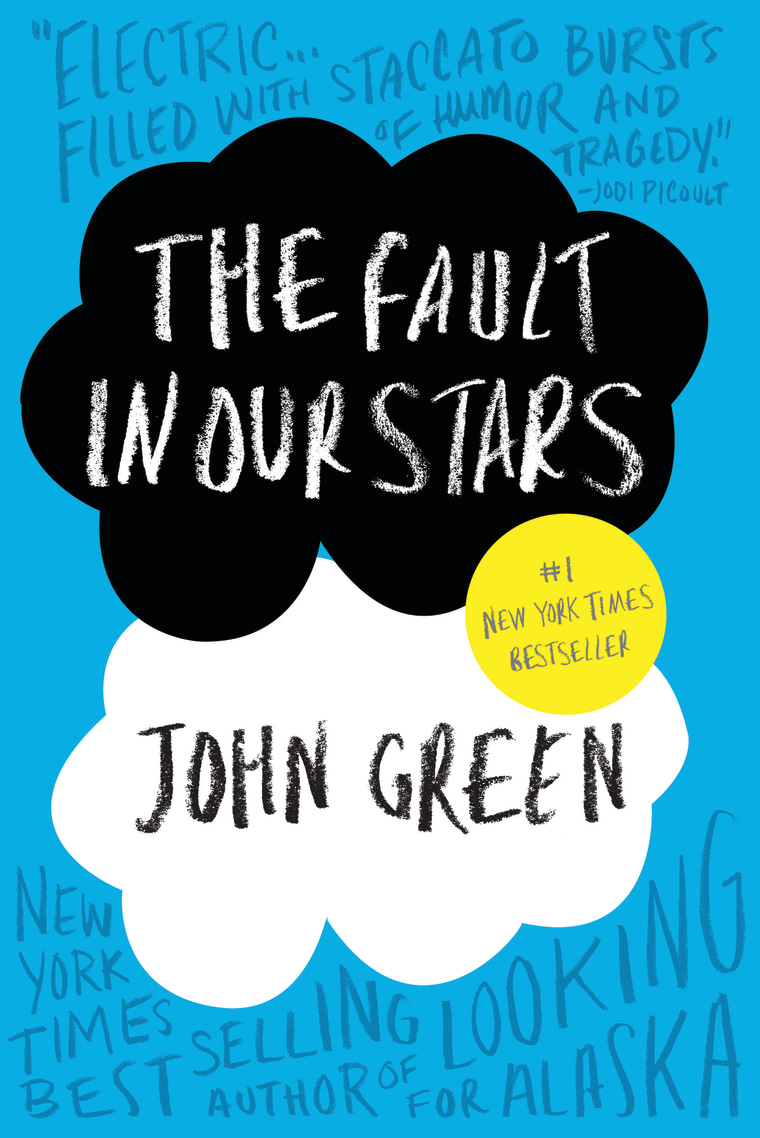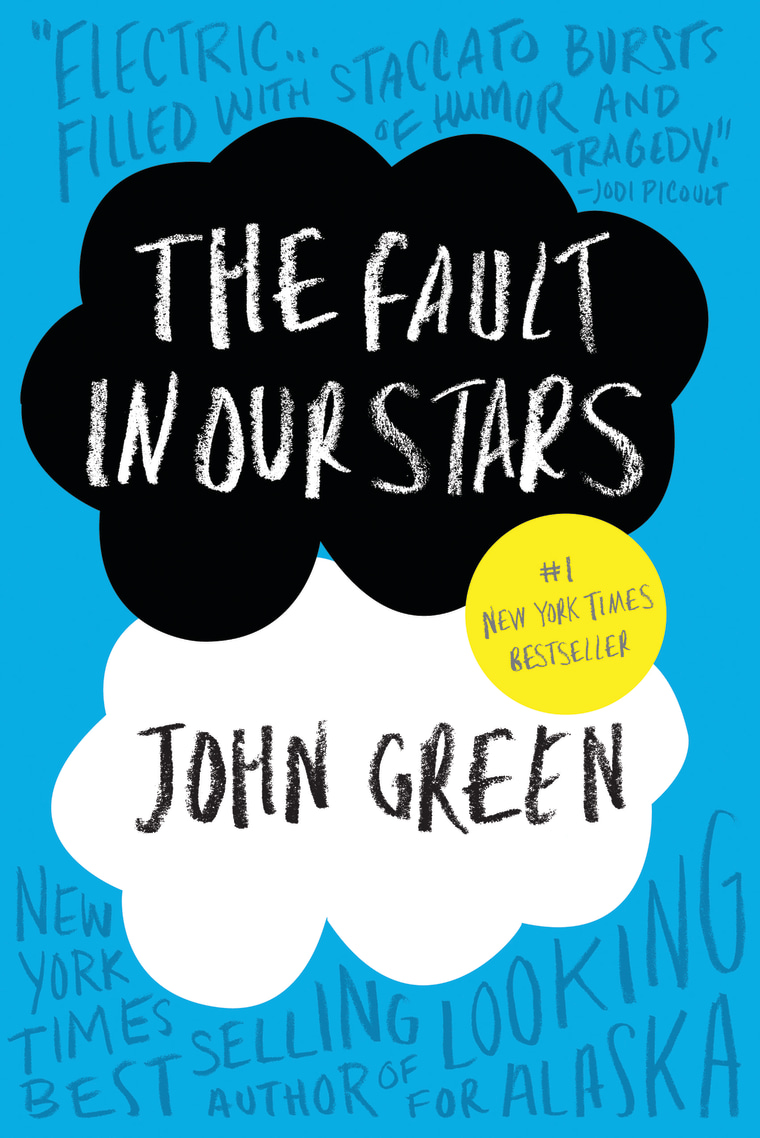
The fourth TODAY Book Club pick is "The Fault in Our Stars" by John Green. Share your thoughts about Green's beloved young adult novel by joining the TODAY Book Club community, a fresh and interactive discussion series, and tweeting with #TFiOSTODAY.
TODAY Book Club members will have the unique opportunity to participate in a Google+ Hangout live from the premiere of the film adaptation of the book. RSVP to the Google+ Hangout with Willie Geist, John Green and the cast of "The Fault in Our Stars" on Monday, June 2 at 6 p.m. ET. Be sure to follow @TODAYsBooks and stay up to date with the TODAY Book Club newsletter.
The cast of "The Fault in Our Stars" will also be answering questions and sharing photos and videos on TODAY's social media accounts, including Twitter, Facebook, Instagram and Vine.
In John Green's "The Fault in Our Stars", a cancer-stricken teen is forcibly sent to a Support Group by her parents in an attempt to remedy her spiraling depression. Though she attends against her will, her motivation reverses when she meets heartthrob Augustus Waters. Here's an excerpt.
Chapter One
Late in the winter of my seventeenth year, my mother decided I was depressed, presumably because I rarely left the house, spent quite a lot of time in bed, read the same book over and over, ate infrequently, and devoted quite a bit of my abundant free time to thinking about death.
Whenever you read a cancer booklet or website or whatever, they always list depression among the side effects of cancer. But, in fact, depression is not a side effect of cancer. Depression is a side effect of dying. (Cancer is also a side effect of dying. Almost everything is, really.) But my mom believed I required treatment, so she took me to see my Regular Doctor Jim, who agreed that I was veritably swimming in a paralyzing and totally clinical depression, and that therefore my meds should be adjusted and also I should attend a weekly Support Group.
This Support Group featured a rotating cast of characters in various states of tumor-driven unwellness. Why did the cast rotate? A side effect of dying.
The Support Group, of course, was depressing as hell. It met every Wednesday in the basement of a stone-walled Episcopal church shaped like a cross. We all sat in a circle right in the middle of the cross, where the two boards would have met, where the heart of Jesus would have been.
I noticed this because Patrick, the Support Group Leader and only person over eighteen in the room, talked about the heart of Jesus every freaking meeting, all about how we, as young cancer survivors, were sitting right in Christ’s very sacred heart and whatever.
So here’s how it went in God’s heart: The six or seven or ten of us walked/wheeled in, grazed at a decrepit selection of cookies and lemonade, sat down in the Circle of Trust, and listened to Patrick recount for the thousandth time his depressingly miserable life story—how he had cancer in his balls and they thought he was going to die but he didn’t die and now here he is, a full-grown adult in a church basement in the 137th nicest city in America, divorced, addicted to video games, mostly friendless, eking out a meager living by exploiting his cancertastic past, slowly working his way toward a master’s degree that will not improve his career prospects, waiting, as we all do, for the sword of Damocles to give him the relief that he escaped lo those many years ago when cancer took both of his nuts but spared what only the most generous soul would call his life.
AND YOU TOO MIGHT BE SO LUCKY!
Then we introduced ourselves: Name. Age. Diagnosis. And how we’re doing today. I’m Hazel, I’d say when they’d get to me. Sixteen. Thyroid originally but with an impressive and long-settled satellite colony in my lungs. And I’m doing okay.
Once we got around the circle, Patrick always asked if anyone wanted to share. And then began the circle jerk of support: everyone talking about fighting and battling and winning and shrinking and scanning. To be fair to Patrick, he let us talk about dying, too. But most of them weren’t dying. Most would live into adulthood, as Patrick had.
(Which meant there was quite a lot of competitiveness about it, with everybody wanting to beat not only cancer itself, but also the other people in the room. Like, I realize that this is irrational, but when they tell you that you have, say, a 20 percent chance of living five years, the math kicks in and you figure that’s one in five... so you look around and think, as any healthy person would: I gotta outlast four of these bastards.)
The only redeeming facet of Support Group was this kid named Isaac, a long-faced, skinny guy with straight blond hair swept over one eye.
And his eyes were the problem. He had some fantastically improbable eye cancer. One eye had been cut out when he was a kid, and now he wore the kind of thick glasses that made his eyes (both the real one and the glass one) preternaturally huge, like his whole head was basically just this fake eye and this real eye staring at you. From what I could gather on the rare occasions when Isaac shared with the group, a recurrence had placed his remaining eye in mortal peril.
Isaac and I communicated almost exclusively through sighs. Each time someone discussed anticancer diets or snorting ground-up shark fin or whatever, he’d glance over at me and sigh ever so slightly. I’d shake my head microscopically and exhale in response.
So Support Group blew, and after a few weeks, I grew to be rather kicking-and-screaming about the whole affair. In fact, on the Wednesday I made the acquaintance of Augustus Waters, I tried my level best to get out of Support Group while sitting on the couch with my mom in the third leg of a twelve-hour marathon of the previous season’s America’s Next Top Model, which admittedly I had already seen, but still.
Me: “I refuse to attend Support Group.”
Mom: “One of the symptoms of depression is disinterest in activities.”
Me: “Please just let me watch America’s Next Top Model. It’s an activity.”
Mom: “Television is a passivity.”
Me: “Ugh, Mom, please.”
Mom: “Hazel, you’re a teenager. You’re not a little kid anymore. You need to make friends, get out of the house, and live your life.”
Me: “If you want me to be a teenager, don’t send me to Support Group. Buy me a fake ID so I can go to clubs, drink vodka, and take pot.”
Mom: “You don’t take pot, for starters.”
Me: “See, that’s the kind of thing I’d know if you got me a fake ID.”
Mom: “You’re going to Support Group.”
Me: “UGGGGGGGGGGGGG.”
Mom: “Hazel, you deserve a life.”
That shut me up, although I failed to see how attendance at Support Group met the definition of life. Still, I agreed to go—after negotiating the right to record the 1.5 episodes of ANTM I’d be missing.
I went to Support Group for the same reason that I’d once allowed nurses with a mere eighteen months of graduate education to poison me with exotically named chemicals: I wanted to make my parents happy. There is only one thing in this world shittier than biting it from cancer when you’re sixteen, and that’s having a kid who bites it from cancer.
From The Fault in Our Stars by John Green. Copyright (c) 2012 by John Green. Reprinted by permission of Dutton Books, an imprint of Penguin Group.
